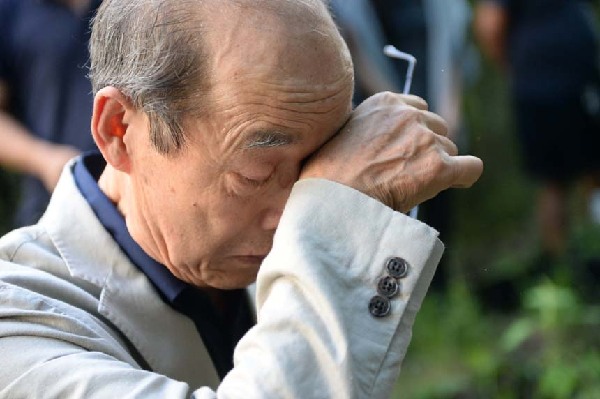Abe's stance on past to decide Japan's future
- By Feng Wei
 0 Comment(s)
0 Comment(s) Print
Print E-mail China Daily, August 13, 2015
E-mail China Daily, August 13, 2015
|
|
|
Nakajima Yohachi, a 73-year-old Japanese war orphan who was brought up by a Chinese family, pays his respects at his Chinese foster parents' tomb in Mudanjiang, northeast China's Heilongjiang Province, on August 10, 2015. [Photo by Wang Kai/Xinhua News Agency] |
Japanese Prime Minister Shinzo Abe is expected to include two key words, "apology" and "aggression", in a speech he will deliver on Aug 14 to mark the 70th anniversary of the end of World War II, Japan's public broadcaster NHK said on Monday.
The initial draft, expressing Japan's deep remorse over the war, and highlighting how it became a pacifist country in the postwar era and its future contribution to the international community, reportedly did not include the word "apology".
Indeed, a genuine apology should come from the bottom of one's heart, which is unlikely in Abe's case even if he apologizes to the countries that suffered under Japanese invasion and occupation before and during WWII, including China and the then undivided Korea. But still, the Japanese leader deserves some credit if he finally agrees to do the right thing.
Former Japanese prime minister Tomiichi Murayama rendered a sincere "apology" for Japan's "aggression" in his landmark statement in 1995. In 2005, Junichiro Koizumi, then prime minister, repeated the statement while addressing the 2005 Asian-African Summit.
On the other hand, Abe has not only avoided apologizing for Japanese atrocities, but also tried to whitewash Japan's shameful past. Just four months ago at the 2015 Asian-African Summit in Jakarta, he promised to express "deep remorse" for what his country did in Asia before and during WWII, but stopped short of offering a "heartfelt apology" for Japan's "colonial rule and aggression". He did the same thing while delivering a speech at a joint meeting of the US Congress in April.







Go to Forum >>0 Comment(s)